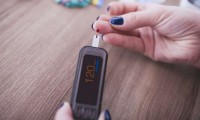-
New AI system for lung cancer and heart disease
- Source: Digital Journal
- 961
- January 15, 2018
-
Starting new COPD inhaler tied to heart attack risk
- Source: Reuters
- 525
- January 3, 2018
-
Marital status could affect heart patients’ risk of death
- Source: msn
- 449
- December 27, 2017
-
AbbVie Scores Key Trial Win for RA Drug With One Fatal Event Reported
- Source: Biospace
- 577
- December 21, 2017
-
Are You Doing A Good Job In Bed?
- Source: msn
- 660
- December 20, 2017
-
WHEN YOUR ACTIVITY TRACKER BECOMES A PERSONAL MEDICAL DEVICE
- Source: wired
- 564
- December 18, 2017
-
Bayer’s rivaroxaban submitted to U.S. FDA for approval in patients with coronary and/or peripheral artery disease
- Source: press.bayer
- 611
- December 15, 2017
-
Apple’s First Medical Study Signals Broader Health Ambitions
- Source: wsj
- 561
- December 11, 2017
-
Novo Nordisk Receives FDA Approval of Ozempic (semaglutide) Injection For the Treatment of Adults with Type 2 Diabetes
- Source: medicalxpress
- 575
- December 6, 2017
your submission has already been received.
OK
Subscribe
Please enter a valid Email address!
Submit
The most relevant industry news & insight will be sent to you every two weeks.













